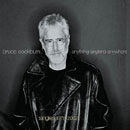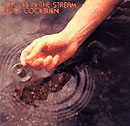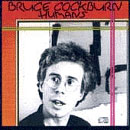Anything, Anytime, Anywhere
| |

| I've been a fan of Bruce Cockburn for a long time - 1979, I think, when a friend played me Circles in the Stream, a live double album. Soon after, I saw him with a band at The Venue in London, playing what would become 1980's Humans and 1981's Inner City Front albums. I even did my degree dissertation on him in 1985. Although I enjoyed the acoustic versions of songs on Circles..., it was the more experimental, slightly jazz-rock feel of Inner City Front I liked [along with its lyrics of urban decay and love against the odds]; the sheer angst, confession and heartbreak of Humans [as far as I'm concerned, part of a divorce diptych with Peter Hammill's Over LP]; the mystical poetry, sourced in author Charles Williams' novels, of Dancing in the Dragon's Jaw; and the new-wave guitar histrionics and extended musical exploration of the standout tracks on Further Adventures Of. Cockburn came out of folk music. His first, eponymous, album is pretty much unlistenable dopehead tosh; High Winds, White Sky is only marginally better. But Sunwheel Dance features a small band, with some lovely guitar work, mainly low in the mix, behind the vocals and acoustic guitar. The songs are far stronger, quirky and original - including the knockout 'Dialogue with the Devil'. Night Vision manages to mix more folk music with some ethnic ambient jazz [!] on 'Lightstorm' and there is a stunning electric guitar work out - worthy of Tom Verlaine himself - on 'Clocks Don't Bring Tomorrow - Knives Don't Bring Good News'. Salt, Sun and Time is an album written on the road: fragments and memories of countries, songs and journeys made filter into what at times sounds like accomplished busking, particularly the clarinet and guitar instrumental duet 'Rouler Sa Bosse'. It's simplicity, clarity and a number of top songs make it a great album. The Television-sounding guitar would emerge again, as would the ethno-jazz. In the Falling Dark contains 'Silver Wheels' a Ginsberg-ian travel poem set to a relentless driving rhythm, over which accumulative lyrical images and a glorious flugelhorn solo float. Further Adventures Of sees Cockburn in sneakers, jeans and leather jacket on the cover, and two extended guitar workouts on 'Outside a Broken Phone Booth With No Money In My Hand' and 'Feast Of Fools'. Cockburn was on a roll as he became a star in Canada and Italy; his intelligent lyrics and mix of musical influences won him many new friends, and several major articles in the UK music press. Then he went and got a social conscience. |

| Albums from 1984's The Trouble With Normal onward invariably include at least one or two overtly political songs - usually inspired by hands-on experience as he travelled the world and worked with aid and refugee agenices. Songs like 'If I Had a Rocket Launcher' were angry, heartfelt responses to situations Cockburn found himself in. I saw him perform this song soon after it was written, and he talked himself up into a black mood for the audience, explaining how and why it was written; how an attempted pacifist came to sing 'if I had a rocket launcher some son of a bitch would die' at the pilots bombing the refugee camp he sat in, sharing his songs and more mundane skills. He got caught up in Nicaraguan politics, he made friends with other campaigning singers like Jackson Browne, he ranted against the IRS and corrupt politicians. And the music changed too. It - not unreasonably - appropriated music from the cultures he visited. Hints of reggae, ska, and other folk idioms appeared in the music, but he never quite seemed to make them his own. And gradually the anger subsided, more personal songs appeared again, and the music got more mainstream, more polished, more - I hate to say - MOR. Whilst concerts - solo ones particularly - could still send a tingle up my spine, more and more of the albums were pleasant outings by someone who used to be my favourite musician. There was always one or two good songs on them, sometimes more, but - to use a cliché - the thrill had gone. Now, for Cockburn's 27th album - including two compilations, three live albums and a double 'best of' - we are offered anything anytime anywhere, a compilation clearly subtitled 'singles 1979-2002'. So, not a best of then; and of course, it features the obligatory couple of remixes and two new tracks to tempt people to buy it who wouldn't otherwise. And anyway, I don't expect many of these were issued as singles in the UK! So, what do we get? 'My Beat' is one of the new songs, and finds Cockburn patrolling Montreal. Violinist Hugh March has turned up again after a gap of 15 years, and alt-country singer Patty Griffin is in there giving it some welly on backing vocals. It hasn't made its mark after a few plays, but it's OK. 'Wondering Where The Lions Are' definitely was a UK single, and is the oldest song on the album [which raises a question about why this particular cut-off point?]. It got loads of airplay back in 1979, and features a seemingly throwaway chorus [the title + 'uh-huh's] that is infuriatingly catchy. The lyrics concern a dream - the singer is caught up in some kind of mystical experience - and he simply can't fathom what the downside [the lions] of the whole thing is! It makes more sense within the album sequence, as the whole album works on a slightly heightened mystical evel, but even removed from a bigger context it's a knockout track. |

| As is 'Tokyo', one of Cockburn's grittiest social realism songs. This time Cockburn is down on his luck already [it's from his divorce album] and seeing a nasty accident simply adds to his depression. Brief glimpses of the city accumulate and the misery is here to stay: 'Oh Tokyo, I never could sleep in your arms' says the singer. '[My] mind keeps on ringing like a fire alarm'. Even so, he says he is going to miss the place as we move on to another city for 'The Coldest Night of the Year'. This is a song Cockburn seems to have made several stabs at getting right. It first appeared around the time of Humans and Inner City Front, and clearly sits among all those songs. [He played it live then too.] But it only surfaced as a North American single, and then on a compilation album, Mummy Dust, several years later. Next time we heard it, it had turned up on a 'best of', remixed; and here it is again with a 2001 remix. Thankfully the slightly cheesy organ is still featured, but the bass end seems to be up far too high, overemphasising the repetition of the song... Why don't people leave things alone? 'The Trouble With Normal is', declares Cockburn, that 'it always gets worse'. Away from the album of the same name, this is a punchy shout of resistance to globalisation and cultural/social apathy. 'Lovers In A Dangerous Time' is glorious too, a pseudo-rebel song, a playful declaration of the need for relationships and joy in a nasty world. Then we get 'If I Had A Rocket Launcher', which simply doesn't - can't, I feel - excite in the way it did first time round. But that aside it's still an honest angry response to one specific incident; and interesting for what anger and fear can produce firsthand as a response to injustice. 'Call It Democracy' is more considered, although in 1985 the 'you don't really give a flying fuck / about the people in misery' lyric meant the single simply didn't get played or it did got bleeped - surely not much use for a song trying to make a political point. Anyway this one bounces stridently along, making important points, and I guess if I put my cynicism about pop's inability to change anything aside, I have to admit that 1. I like it and 2. it possibly got a few people thinking about things. The rest of the compilation is interesting in that it pretty much is what I would regard as the best tracks from the recent albums - with one ghastly exception. [Hold on, I'll tell you when we get there.] 'Waiting for a Miracle' has got a horrible new remix production gloss on it, but its seductive tune remains, snaking among the big ensemble of musicians. 'If a Tree Falls' is an overlong blues workout on an ecological theme; 'A Dream Like Mine' is a lovely track from Nothing But a Burning Light, probably my favourite of the recent albums. Next up is the appalling [this is the one] r'n'b workout, 'Listen for the Laugh', which opens Dart to the Heart and simply puts me off the whole album each time I go to play it. Cliché horns, honkytonk organ, relentless drums and plodding bass lines... oh, its horrible, horrible. [And stops me paying much attention to some later songs on the album like 'Closer to the Light' and 'Someone I Used to Love', arguably classic Cockburn songs.] |
Moving on, two tracks from The Charity of Night appear. 'Night Train' is a wonderful, clattering song that does exactly what the titles says; 'Pacing the Cage' has one of the most haunting tunes I know, and a lovely, melancholy lyric. [Actually, looking at Charity... again, it's a pretty good album too.] The CD closes with 'Last Night of the World' which I can do without - it's a rather ordinary city & friends scenario song we've heard before from this songwriter - and the other new track, the title song, which I already like a lot. It's a good closing statement, opening up the album rather than closing it down. Everything seems possible again, though I for one wish he'd play guitar more like what he used to. © Rupert Loydell 2002 [anything anytime anywhere is on Cooking Vinyl] |